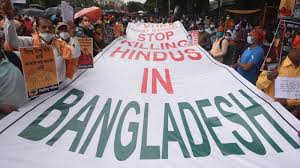
28-Nov-2024 , Updated on 11/28/2024 9:27:33 PM
Killings of Hindus in Bangladesh: When it will stop?
The continuous targeted attacks on Hindus in Bangladesh have led to concerns about the situation of minority people in Bangladesh. Nevertheless, the attacks go on unabated, and the wounds inflicted on a country that prides itself on a secular charter remain growing out there for the whole world to see.
How did we get here? Let me go back to history and look at the facts under Sheikh Hasina’s rule, and, more to the point, when and where does this violence cease?
Historical context of marginalisation
Hindus being attacked in Bangladesh did not start yesterday, nor has it emerged out of the blue. Perhaps it stretched back to the partition of 1947, when the subcontinent was partitioned between India and Pakistan, forming East Pakistan or Bangladesh. Soon Hindus, though a minority of the newly formed East Pakistan, were suppressed and persecuted by the Pakistan regime.
The horror was escalated during the 1971 Liberation War. About 2.4 million Hindus were killed by the Pakistani military and its collaborators at the time when Bangladesh was struggling for independence. Most of them run away to India for their asylum. While the war concluded with Bangladesh's independence, the persecution of Hindus continued with targeted violence.
To date, many of them are struggling to fend for themselves and their families, unlike before, whereas the Vested Property Act, which is this very law that discriminates against only the Hindus owning property, made it worse. Tens of thousands of Hindus were dispossessed of their birthright in their own country under the pretext of the state acquiring ‘enemy property’. Nevertheless, this law goes on tormenting many families even after committing to receiving justice.
Under Sheikh Hasina: The Dual Reality
Of late, there have been some riots during such festivals as ‘Durga Puja’. Temples are bombed, statues are vandalised, and the houses and shops owned by Hindus are burgled.
The current government of Hasina also reacted violently but could draw much criticism for its failure to avert such occurrences. Supposing her government initiates actions after the incident, sceptics can only wonder, Why aren’t there better preventive measures against hate speeches and attacks?
A Culture of Impunity
Of all of these factors, the primary one is the culture of impunity. Attackers who lay their traps on Hindus do not get arrested, and in some incidences, those who attacked get away with light sentences, which encourages others. Local leaders as well as banned groups, including Hefazat-e-Islam, are blamed for provoking violence, but justice is seldom sought.
Also, the latest extremism of the Islamist kind in Bangladesh is now threatening minorities directly.
The Different International Pressure
As a neighbour and its huge Bengali Hindu population, India has often raised alarm over human rights abuses of Hindus in Bangladesh. However, the response has more often than not been a diplomatic one. The international community has not reacted much to this issue, but what has fascinated them is the growth of the economy and the position of Bangladesh in the global power play system.
This sort of silence contributes to the continuing violence globally, and that is why it is lacking in this case.
What Needs to Change?
The murder and extermination of Hindus in Bangladesh should not be ignored any longer. Here’s what needs to happen:
Stronger Laws and Enforcement: Despite such features, the Bangladeshi government needs to implement and apply laws that will protect the rights of ethnic minorities in the country. Hate crime incidents should be challenged immediately and given an appropriate punishment.
Community Awareness: Community tensions can be decreased through better interfaith dialogue and people’s campaigns.
International Scrutiny: Though the organisation has urged the Indian side to pursue diplomatic pressures on Bangladesh for the safety of minorities, it is the responsibility of India, the United States, the European Union, etc.
Holding Extremist Groups Accountable: Those organisations that are calling for violence must be declared unlawful and their leaders prosecuted.
The Bigger Question
When will it stop? The answer is not just in Bangladesh but in how governments, civil society, and the global community will come forward to safeguard the rights of individuals.
And for Bangladesh to be secular as it claims to be, the Hindus are again nowhere to be seen, or they are treated the way Pakistan treats its minorities. Sheikh Hasina’s government has a choice: to fight and save the Hindus or to let history be the only judge of their failure to act.
The killings and violence have to stop. Performing radical change not at the end of the line, not tomorrow, but now. Since all lives are precious and justice postponed is injustice, therefore lasting and just.

Student
hey there! i am a student currently pursuing my bachelors with a keen interest in writing., I am fueled by a deep love for storytelling and a flair for creating captivating narratives. Armed with a passion for language and a keen eye for detail, I strive to craft compelling copy that leaves a lasting impact.
Join Our Newsletter
Subscribe to our newsletter to receive emails about new views posts, releases and updates.
Copyright 2010 - 2026 MindStick Software Pvt. Ltd. All Rights Reserved Privacy Policy | Terms & Conditions | Cookie Policy